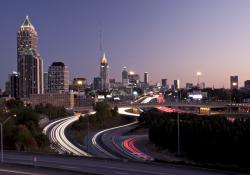The electronic highway signage system and field devices that provide real-time travel information for the 300,000 daily users of New York’s George Washington Bridge are to undergo a major overhaul in a US$65.1 million project.
The Port Authority of New York has approved the project to replace the intelligent transportation system (ITS) which includes the upgrade and replacement of 11 existing variable message signs and the installation of seven new ones; the installation of a new overhead sign structure; the upgrade and replacement of fixed message signs; the replacement of variable message signs, vehicle detectors, traffic cameras, travel time readers and a weather information station.
The bridge's ITS system feeds traffic data to TRANSCOM, a consortium that operates a regional traffic management system and provides information to all member agencies for radio reports, highway signs, traffic apps and other means of disseminating traffic information.
"Moving people and goods smoothly and safely through the region is our primary mission," said Port Authority chairman John Degnan. "Utilizing the latest technology to better manage traffic congestion at our bridges and tunnels plays an important part in that effort."
"The Port Authority's facilities are critical to moving people and goods throughout the region," said Port Authority vice chairman Scott Rechler. "Today's action to employ this intelligent transportation system will help move the 300,000 commuters that cross the world's busiest bridge everyday and reduce congestion throughout the region."
The project is due to begin in the fourth quarter of 2017 and be completed by the second quarter of 2020.
The Port Authority of New York has approved the project to replace the intelligent transportation system (ITS) which includes the upgrade and replacement of 11 existing variable message signs and the installation of seven new ones; the installation of a new overhead sign structure; the upgrade and replacement of fixed message signs; the replacement of variable message signs, vehicle detectors, traffic cameras, travel time readers and a weather information station.
The bridge's ITS system feeds traffic data to TRANSCOM, a consortium that operates a regional traffic management system and provides information to all member agencies for radio reports, highway signs, traffic apps and other means of disseminating traffic information.
"Moving people and goods smoothly and safely through the region is our primary mission," said Port Authority chairman John Degnan. "Utilizing the latest technology to better manage traffic congestion at our bridges and tunnels plays an important part in that effort."
"The Port Authority's facilities are critical to moving people and goods throughout the region," said Port Authority vice chairman Scott Rechler. "Today's action to employ this intelligent transportation system will help move the 300,000 commuters that cross the world's busiest bridge everyday and reduce congestion throughout the region."
The project is due to begin in the fourth quarter of 2017 and be completed by the second quarter of 2020.











